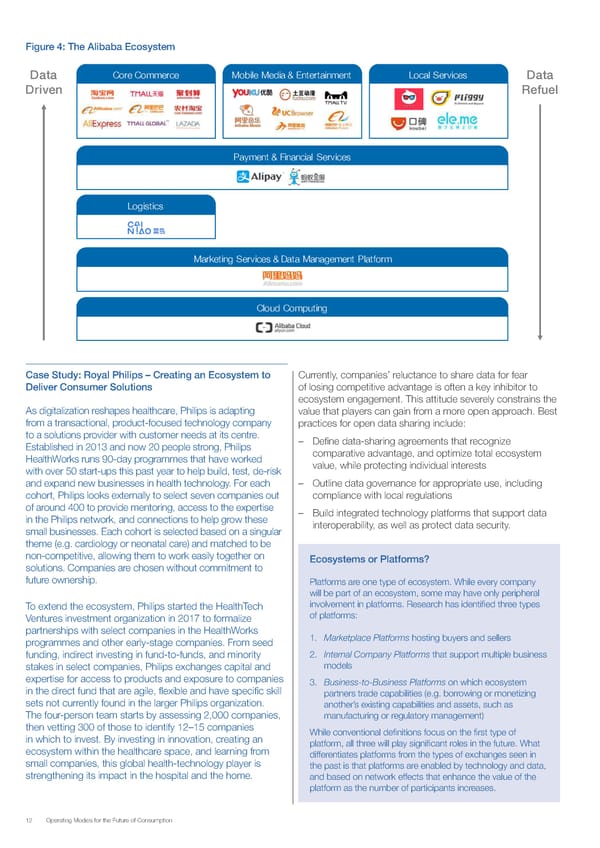Figure 4: The Alibaba Ecosystem Data Core Commerce Mobile Media & Entertainment Local Services Data Driven Refuel Payment & Financial Services Logistics Marketing Services & Data Management Platform Cloud Computing Case Study: Royal Philips – Creating an Ecosystem to Currently, companies’ reluctance to share data for fear Deliver Consumer Solutions of losing competitive advantage is often a key inhibitor to ecosystem engagement. This attitude severely constrains the As digitalization reshapes healthcare, Philips is adapting value that players can gain from a more open approach. Best from a transactional, product-focused technology company practices for open data sharing include: to a solutions provider with customer needs at its centre. – Define data-sharing agreements that recognize Established in 2013 and now 20 people strong, Philips comparative advantage, and optimize total ecosystem HealthWorks runs 90-day programmes that have worked value, while protecting individual interests with over 50 start-ups this past year to help build, test, de-risk and expand new businesses in health technology. For each – Outline data governance for appropriate use, including cohort, Philips looks externally to select seven companies out compliance with local regulations of around 400 to provide mentoring, access to the expertise – Build integrated technology platforms that support data in the Philips network, and connections to help grow these interoperability, as well as protect data security. small businesses. Each cohort is selected based on a singular theme (e.g. cardiology or neonatal care) and matched to be non-competitive, allowing them to work easily together on Ecosystems or Platforms? solutions. Companies are chosen without commitment to future ownership. Platforms are one type of ecosystem. While every company will be part of an ecosystem, some may have only peripheral To extend the ecosystem, Philips started the HealthTech involvement in platforms. Research has identified three types Ventures investment organization in 2017 to formalize of platforms: partnerships with select companies in the HealthWorks 1. Marketplace Platforms hosting buyers and sellers programmes and other early-stage companies. From seed funding, indirect investing in fund-to-funds, and minority 2. Internal Company Platforms that support multiple business stakes in select companies, Philips exchanges capital and models expertise for access to products and exposure to companies 3. Business-to-Business Platforms on which ecosystem in the direct fund that are agile, flexible and have specific skill partners trade capabilities (e.g. borrowing or monetizing sets not currently found in the larger Philips organization. another’s existing capabilities and assets, such as The four-person team starts by assessing 2,000 companies, manufacturing or regulatory management) then vetting 300 of those to identify 12–15 companies While conventional definitions focus on the first type of in which to invest. By investing in innovation, creating an platform, all three will play significant roles in the future. What ecosystem within the healthcare space, and learning from differentiates platforms from the types of exchanges seen in small companies, this global health-technology player is the past is that platforms are enabled by technology and data, strengthening its impact in the hospital and the home. and based on network effects that enhance the value of the platform as the number of participants increases. 12 Operating Models for the Future of Consumption
 Operating Models for the Future of Consumption Page 11 Page 13
Operating Models for the Future of Consumption Page 11 Page 13